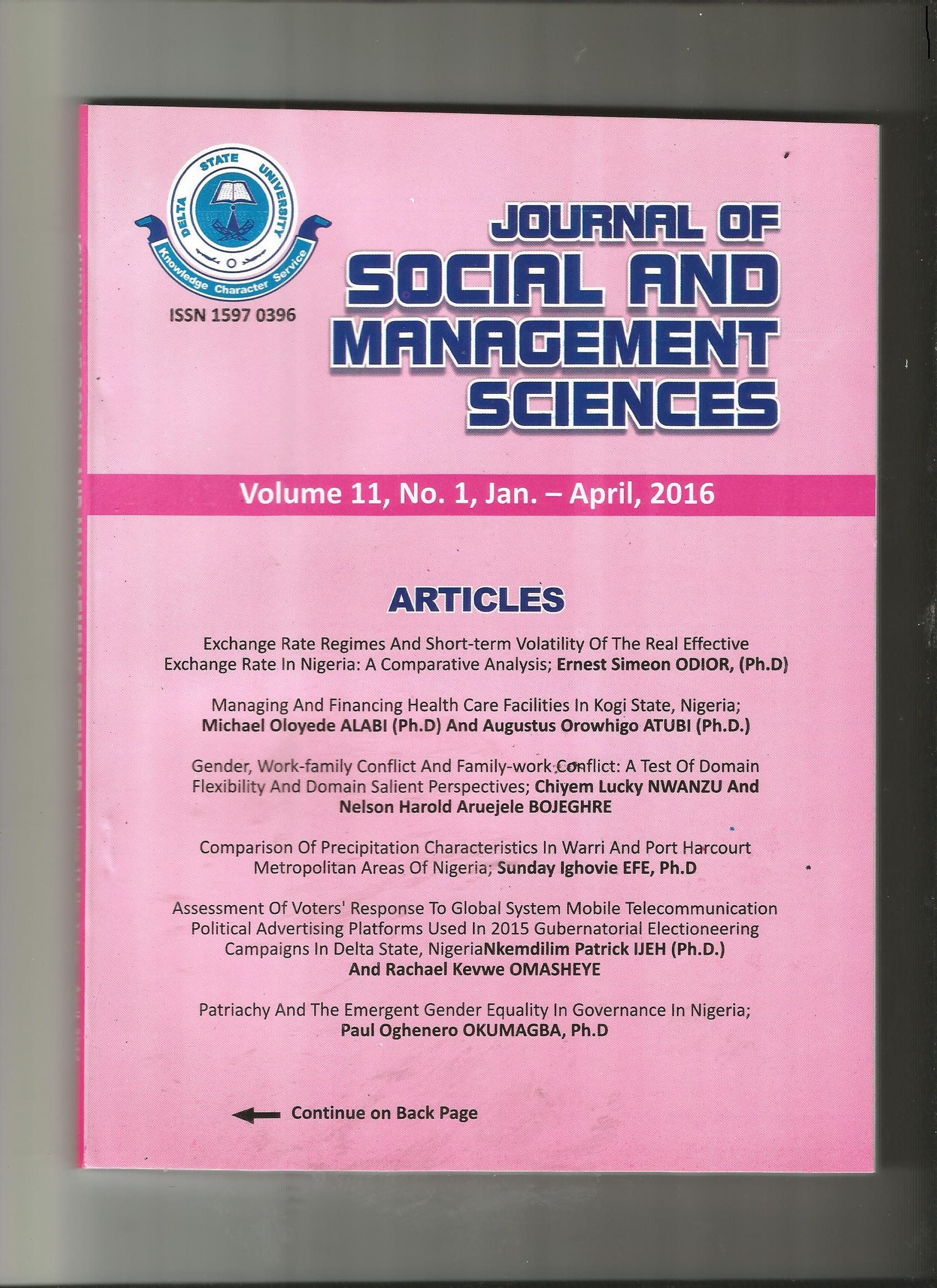
JOURNAL OF SOCIAL AND MANAGEMENT SCIENCES
Journal of the Faculty of Social Sciences, Delta State University, Abraka, Nigeria
ISSN: 1597-0396
DOI: 10.5987/UJ-JSMS
Email: jsms@universityjournals.org
INFLUENCE OF SOCIAL MEDIA USE ON THE SOCIAL DEVELOPMENT OF NIGERIAN ADOLESCENTS AND YOUTHS
DOI: 10.5987/UJ-JSMS.17.062.1 | Article Number: 31057C409 | Vol.12 (1) - April 2017
Authors: ASHIEKPE James Aondowase and MOJAYE Eserinune McCarty
Keywords: Youths, Social Media Use, Social Development
Nigerian adolescents and youths are the most prolific ICT savvy group of people. They are also noted to be very active users of social media in Africa, only ranking second to Egypt. While social media has no doubt accelerated and enhanced the global communication spectrum, there are concerns regarding the negative effects on the social development of adolescents and youths who are the most prolific users. This study therefore sought to examine the effects of social media use on the social development of Nigerian adolescents and youths. Using survey as the research design, a questionnaire was administered on 250 adolescents and youths, between the ages of 16 and 40 years old, who use social media networking sites. Findings show that 96% of Nigerian adolescents and youths are engaged in social media use either in the continuous-sporadic or the discrete-intensive mode based on motivations and interests; 98% devote a significant amount of time daily to social media use; and that the social development of Nigerian adolescents and youths is influenced in varying degrees by social media use. The study concludes that social media use, if not checked, may have the potential to affect and impact Nigerian adolescents and youths negatively.
Adamu, L.S. (2011). The influence of third screen on students' academic performance in Ahmadu Bello University, Zaria. Nigerian journal of media and communication research, 9 (1), pp.31-54.
Ahn, J. (2011). The effect of social network sites on a d o l e s c e n t s ' a c a d e m i c a n d s o c i a l development: Current theories and controversies. Journal of the American society for information science & technology, 62 (8) pp. 1435-1445.
Allen, J.P., Evans, M.A., Hare, A.L., & Mikami, A.Y. (2010). Adolescent Peer Relationships and Behavior Problems Predict Young Adults' Communication on Social Networking Websites. Developmental P s y c h o l o g y, 4 6 ( 1 ) , 4 6 - 5 6 . d o i : 10.1037/a0017420.
Arnett, J.J (2000). Emerging adulthood: A theory of development from the late teens through the twenties. American psychologist, 55, pp. 469-480.
Bell, V. (2010). A history of media technology scares, from the printing press to facebook. Slate magazine: Politics, business, technology, and the arts. Retrieved October 21, 2013, from http://www.slate.com/articles/health_and_ scienec/science/2010/02/dont_touch_that_ dialhtml.
Boyd, D. (2008). Taken out of context: American teen sociality in networked publics. Berkeley, CA: University of California.
Buffardi, L.E. & Campbell, W.K. (2008). Narcissism and social networking web sites. Personality and social psychology bulletin, 34 (10) pp. 1303-1314.
Carr, N. (2010). The effects of the internet: Fast forward. The economist: World news, politics, economics, business. Retrieved N o v e m b e r 6 , 2 0 1 3 , f r o m http://www/economist.com/node/1642333 0.
Dahl, R.E. (2004). Adolescent brain development: A period of vulnerability and opportunity. Annals of the New York academy of sciences, 1021 pp. 1-12.
Ellison, N.B., Steinfield, C., & Lampe, C. (2007). The benefits of facebook “friends”: Social capital and college students' use of online social network sites. Journal of computer mediated communication, 12 (4), pp. 1-16.
Enyedy, N., Golberg, J., & Welsh, K.M. (2005). Complex dilemmas of identity and practice. Science education, 90 (1) pp. 68-93.
Gigli, S. & Genova, A. (2001), Young people and media in central & eastern Europe, the CIS & Baltic states. A report prepared by intermedia for UNICEF.
Jain, M.R., Gupta, P. & Anand, N. (2012). Changing mindset of youth on social issues – a study of Delhi-NCR youth. Journal of arts, science & commerce, III, 2 (2) pp. 36-43.
Kuhn, D. (2009). Adolescent thinking. In R. M. Lerner & L. Steinberg (Eds.) Handbook of adolescent psychology (3rd ed.). New York: Wiley.
Lenhart, A. (2007). Cyberbullying/pew research center's internet & American life project. Pew research center's internet & American life project. Retrieved October 10, 2013, from http://www.pewinternet.org/Reports/2007/ Cyberbullying.aspx.
Lenhart, A. & Madden, M. (2007). Teens, privacy, & online social networks: How teens manage their online identities and personal information in the age of Myspace. Washington, DC: Pew Internet &American Life Project.
Lenhart, A. (2008). Teens, video game and civics/pew research center's internet & American life project. Retrieved September 2, 2012, from http://www.pewinternet.org/Reports/Teens-Video-Games-and-Civics.
Lenhart, A., Purcell, K., Smith, A., & Zickuhr, K. (2010). Social media and mobile internet use among teens and young adults. Pew internet & American life project. Retrieved October 10, 20 13, from http://web.pewinternet.org/~/media/Files/ Reports/2010/PIP_Social_Media_and_Young_Adults_Report_Final_with_topli nes.pdf.
Morozov, E. (2010). Losing our minds to the web. Prospect magazine. Retrieved November 17, 2013, from http://prospectmagazine.co.uk/magazine/losing-our-minds-to-the-web/.
Neelamalar, M. & Chitra, P. (2009). New media and society: A study on the impact of social networking sites on Indian youth. Estudos em comunicacap, No. 6, pp. 125-145.
Roberts, D.F., & Foehr, U.G. (2008). Trends in media use. The future of children, 18 (1), 11-37.
Sobieraj, S., & Berry, J. (2011). From incivility to outrage: Political discourse in blogs, talk radio, and cable news. Political communication, 28 (1) pp. 19-41.
Terragon Insights (2013). State of digital media Nigeria. Lagos: Terragon Insights Limited.
Udende, P. & Azeez, A.L. (2010). Internet access and use among students of university of Ilorin, Nigeria. Journal of communication and media research, 2 (1), pp. 33-42.
Valkenburg, P.M. & Peter, J. (2009). The effects of instant messaging on the quality of adolescents' existing friendships: A longitudinal study. Journal of communication, 59 pp. 79-97.
